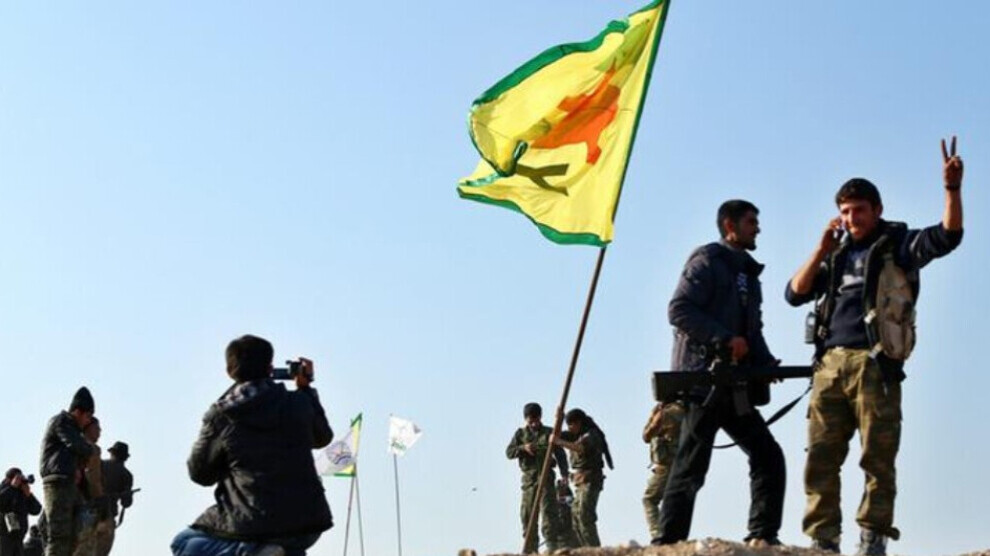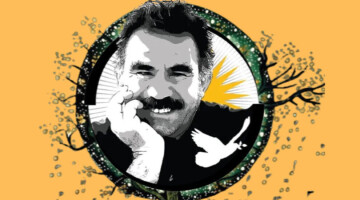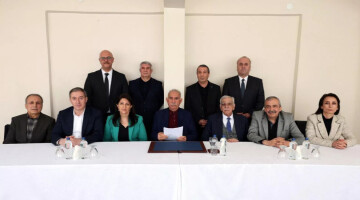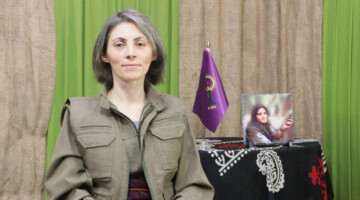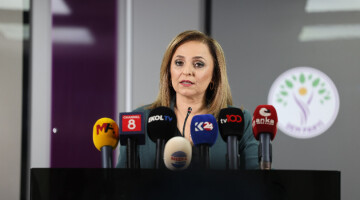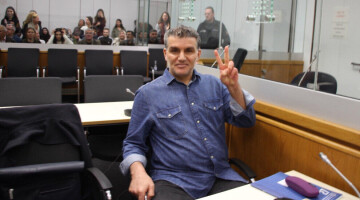Following the call of 130 academics, writers and journalists from different countries of the world, including Nobel Peace Prize winner, human rights defender Adolfo Perez Esquivel and American philosopher and linguist Noam Chomsky, 1 November 2014 was declared as World Kobanê Day by the European Union Turkey Civic Commission (EUTCC) and Peace Campaign Initiative with the call for “global mobilisation for Kobanê and humanity” against ISIS.
People in Daraa, in the south of Syria, started demonstrations against the government on 15 March 2011. When these demonstrations started to spread to other cities of the country, the Damascus government started to use violence against the people in order to suppress the uprising. In particular, Ahrar al-Sham, al-Nusra Front and many other mercenaries supported by the Turkish state and some regional states started to attack the cities of Rojava (Western Kurdistan). The first attack was on the city of Serêkaniyê. Thanks to the great resistance of Kurdish youth, all attacks by the mercenaries were thwarted. On the one hand, the people of Rojava were waging a relentless struggle against the attacks of the mercenaries supported by the Turkish state. On the other hand, they were continuing their self-administration efforts.
Popular organisation first, then the declaration of the revolution
In Kobanê, work began on the formation of the People's Assembly on 23 February 2012. In parallel, activities such as Mala Jin (Women's House) and a Kurdish language institution were accelerated. On 19 July 2012, the first spark of the revolution was lit in Kobanê, which would go down in history as the symbol of resistance. The people of Kobanê seized the institutions affiliated to the Damascus government and declared the 19 July Revolution. The spark lit in Kobanê continued in Afrin and Cizre.
The arrival of ISIS, the road map of resistance
In June 2014, ISIS captured Mosul, the largest city of Iraq, in only 6 days. In August of the same year, ISIS attacked Shengal and started to spread fear all over the world. Descending like a dark black cloud wherever it entered, ISIS created a hurricane of fear all over the world. ISIS designated the Syrian city of Raqqa as its capital, and started selling hundreds of women they kidnapped from Shengal (Sinjar) in public squares. On 15 September 2014, ISIS launched an attack on the village of Serzûrî, 37 kilometres away from Kobanê. They were planning to divide Kobanê into two and thus make the occupation easier by taking Serzûrî, a strategic position in the region. Yet, there was something that ISIS did not consider. Kobanê was not like Mosul, Raqqa or Shengal. There were 12 free-spirited, selfless fighters who had created themselves with the Apoist philosophy. The resistance of 12 selfless Kurdish youngsters in Serzûrî determined the road map of the resistance to be put up from then on.
Resistance exceeding the borders
The people and fighters of Kobanê, with the limited means at their disposal, put up a historic 134-day resistance against ISIS. This resistance then began to spread to all parts of Kurdistan in waves. Especially in Northern Kurdistan, thousands of young people started to flock to Kobanê. People tried to cross the border into Kobanê. The Turkish state, the biggest supporter of ISIS, attacked the masses gathered at the border, but they could not succeed in making Kurdish youth, women, old people and children take a single step back. With each passing day, the number of people supporting the Kobanê resistance was increasing. The growing resistance in Kobanê was now exceeding the borders of Kurdistan and spreading all over the world in waves. Kurds and their friends were standing up all over the world.
The defeat started in Kobanê, ended in Baghouz
As the anger against ISIS grew all over the world amid the Kobanê resistance, the hatred and anger of the Turkish state, which patronised ISIS, against the Kurdish people and the Rojava revolution was also growing. So much so that Turkish President Tayyip Erdoğan openly confessed his support for ISIS. On 7 October 2014 in Antep, Erdoğan said ‘Kobanê is about to fall’. After these remarks, the anger of the Kurdish people erupted like a volcano. 50 civilians lost their lives as a result of the attacks of the Turkish state's counter forces in these uprisings that went down in history as the ‘6-8 October Protests’. On 26 January 2015, Kobanê declared the first defeat that would bring about the end of ISIS.
After Kobanê, YPG, YPJ and SDF fighters started operations to erase ISIS mercenaries from the territory of Northern and Eastern Syria. The resistance that started in Kobanê continued in Manbij, Tabqa, Raqqa and Deir ez-Zor, and lastly in Baghouz (Baxoz), the last stronghold of ISIS.
Indigestible defeat, attack on the supporters of resistance
Unable to digest the defeat of ISIS, the Turkish fascist government started to roll up its sleeves for ‘revenge’. In the first place, it started an arrest storm against those who supported the resistance under the name of ‘Kobanê Conspiracy Case’. Hundreds of people were detained, imprisoned and tortured. They were not satisfied with this, and put new genocide plans into action against Kobanê, the stronghold of the resistance against ISIS cruelty. They bombed Kobanê every day under various pretexts and massacred newborn children and women.
People have shown that they will not submit
On 5 October 2023, the Turkish state carried out an intensive attack on Northern and Eastern Syria. During these attacks, all infrastructure, service areas and civilian places were targeted and dozens of civilians lost their lives. The people of Rojava, who buried those martyred in the invasion of the Turkish state, continued their resistance against attacks. In fact, in this past year, they have shown with their determined and resistant stance that they will increase their struggle against the occupying Turkish state and ISIS and not submit.
The Turkish state once again launched attacks on 23 October 2024 against the areas of Northern and Eastern Syria. In these 4-day attacks, civilian areas, the entire infrastructure of the region, living spaces and economic areas of the people were targeted. Once again, the people of Rojava continue to resist the attacks of the Turkish state.
A people who have tasted freedom once will not be easily defeated
The people of Kobanê and all the people of Northern and Eastern Syria, who continue their resistance against the invasion attacks of ISIS and the Turkish state, will celebrate the day when their resistance in Kobanê opened to the world on 1 November in the shadow of the attacks. Kobanê is ready to send a message to the Turkish state that a people who have tasted freedom once will not be easily defeated.

